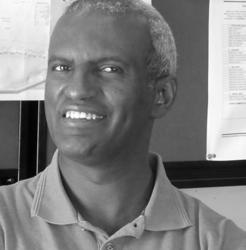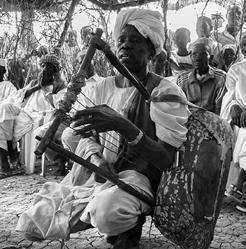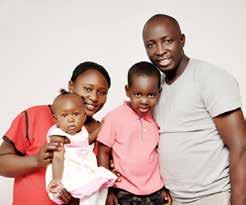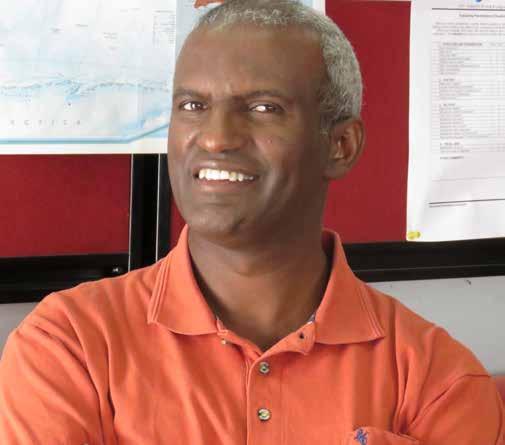Ethiopia’s long history of sending & supporting







03 - Editorial
04 - How we experienced God’s call to mission
05 - How can I be sure I’m on the right track?
06 - Perspective
07 GO! News of Africa’s missionaries
08 - Why we GO - People Groups
Cover: Ethiopian missionaries
Abebe and Abebech formerly served in S Sudan and now work with AIPM in Ethiopia. Photo by James Briggs.

© 2016 AFRIGO AFRIGO is a quarterly publication aimed at raising awareness, mobilising, training and inspiring churches and individuals in Africa towards global mission.

Editor: Suzanne Green Design: Shelbey Hunt
Stock photos are occasionally used. Pseudonyms are used when there are security concerns.
AFRIGO: info@afrigo.org
AFRITWENDE: afritwende@afrigo.org
ALLONS-Y ! : info@afrigo.org
AFRÍDE: afride@afrigo.org
SIM East Africa:
Tel: +251 911 206 530 east-africa.office@sim.org

SIM West Africa:
Tel: +233 30 222 5225 wamo.personnel@sim.org
SIM Southern Africa:

Tel: +27 21 715 3200 za.enquiries@sim.org
AIM International amc.io@aimint.org www.aimint.org/africanmobilization/
Fifteen years ago, a year after I left secondary school, I was full of dreams of becoming an accountant. But God was training me for his service.
When we are sure of that call, and living in obedience to God’s Word, we can seek his guidance about how He wants us to serve Him.
For many years, “missions” meant the West sending missionaries to the rest of the world. But the Lord is using people from all over Africa to share the good news of salvation through repentance and faith in Jesus Christ.
One of the groups taking refuge in Mabaan, South Sudan is the Ingessana, a people who have never been conquered.

Calling. There’s that word again! Who calls? Who is called? Why should I even bother with a “call?” Yet for thousands of years the living God, in his amazing love, has called people to carry out his eternal purpose for his glory.
Indeed, many have heard that call and responded with a joyful yes. Others have heard it and responded with a reluctant “yes,” and others still have heard it and responded with an emphatic no. Jonah said “no” and ended up in the belly of a fish. But even he could not escape the call “for the gifts and calling of God are irrevocable” (Romans 11:29).
At first I said “no” too. I had my life planned out. Reluctantly, I was going to be a medical doctor, but certainly not a missionary. A Nigerian, I’d heard the stories of the many who had come to Africa with the good news of Jesus Christ, but I didn’t consider myself one of them. I wasn’t even thinking of supporting mission!
I wanted to live a simple life, with a good wife and some children. I planned to help in my church, but I wanted to leave crosscultural mission to others. I was certain I knew what was right for me, where I should be and what I should be doing. I expected that God would agree with me – why shouldn’t He?
Yes, I thought that I was certain … until God came calling. I read about the needs of the nations, billions
who were dying without ever hearing the gospel. People who would not share eternity with Christ because no one had ever explained to them that He had died for their sins and risen again. I learned that missionaries had lived and died in Africa, dedicated to sharing God’s good news. Many others had provided funds so that they could serve Africans. Their stories captivated and challenged me. Challenged my complacency and my willingness to accept a religion rather than actively living for Christ. Challenged me to listen as they listened so that, like them, I could hear Christ saying “follow me.”
Hearing God’s call means following Him. It means dying so that we can
truly live. Eventually I heard that call, and there has been no looking back. I am a missionary committed to going wherever God leads and doing whatever He calls me to do with the fullness of his joy in what I am doing. Are you hearing his call?
I am happy to introduce you to AfriGo, a new publication dedicated to supporting and encouraging the growing missions movement in Africa! This is the first issue of the quarterly magazine, which will hopefully soon be available both online and in print.
In each issue you will find articles by African missionaries and leaders, as well as news about ministries, people and events. We will also feature articles aimed at answering questions
for those who want to get involved in or support world mission. Soon a companion magazine, in French, will be available for Africa’s Frenchspeaking nations.
More and more churches are sending those who have heard God’s call to take the gospel to another culture or country – both in Africa and beyond. That is why “Go” is part of the name of our magazine. It is there because of the “go” in Matthew 28:19, God’s Great Commission!
Too many people are still living and dying without ever coming to a saving knowledge of Jesus Christ! May AfriGo help to change that reality.
Rev. Dr. Joshua Bogunjoko SIM International Director

an accountant. It seemed that it did fail. I applied online and paid the fees to attend the YWAM School in Togo, but then the school closed down. I told God, “You see, I know I am not a missionary, and I believe you will leave me alone now.”
The Lord provided further missions training by sending me to the Philippines and South Korea and then to serve in Burkina Faso. I went as a single man, but Malata and I became friends and God directed us to get married.
Fifteen years ago, a year after I left secondary school, I was full of dreams of becoming an accountant. But God was training me for his service. My calling to become a missionary did not come through a dream – I rarely remember my dreams. Instead, it came as a growing personal conviction.
I came from a family with a low-level income, and my desire was to finish my tertiary education, start work and help my family financially and otherwise. I pursued my dream, carefully and with great enthusiasm. But God kept bringing YWAM (Youth with a Mission) to my mind and heart. It seemed He was drawing me to work with the Church, something I didn’t want to do –I wanted to find a well-paid job and support my family.
When I realised the YWAM issue wasn’t going away, I decided to give it a try to see what God was telling me. I was hoping it would fail, so that I could continue pursuing my dream of being
God kept silent for some years. I went for my tertiary studies, studied Accountancy to a National Diploma Level and aspired to complete another two years to earn a Higher National Diploma in Accountancy. But before I could go for the final two years – in fact, before the end of my first two years – I saw an ad for a job as Account Officer/Secretary with NEMI (Nigerian Evangelical Missions Institute). I applied for the job, thinking it would be wellpaid. However, the offer was much lower than what I made at the Polytechnic, where I did a typing job. So I refused it.
But the Lord has his own ways of tracking us down. The leaders of NEMI pursued me, coming to my house to check on me for about a year. But I refused to go. Finally, I went to chat with the principal. We were able to agree on an addition to the salary, and I accepted the job.
God spoke to me again about missions through Rev. Kwang Yun Lee, who helped confirm God’s call for me. He also prayed for a year that I would resign my position and enroll in missions training. Finally God got my attention and I began training with NEMI to become a missionary.
I explained to Malata what it takes to be a missionary, wanting to see if she would be willing to join me in this noble calling. Many think missionary service is for “beggars” or those who do not have a good job. But actually missionaries have the most strategic and important job of all: serving the King of Kings! I didn’t know that Malata’s grandparents had been missionaries. She said “yes” to missionary service before she said “yes” to my marriage proposal!
Today Malata and I have been married five years, and God has blessed us tremendously with our two children, Hadriel (5) and Kirsten-Aurora (6 months). We have been in Burkina Faso for six years, serving with the SIM team as the Projects Coordinator, and in the Teen Challenge Ministry among drug addicts and street boys, in Muslim evangelism, teaching English/Bible studies and children’s ministry.
We have seen his glory and his grace, and have experienced the perfect peace and joy that surpasses all understanding in doing what He has called us to do in Burkina Faso.
In a general sense we are all called. We are called to salvation by a God who loves us and calls us according to his purposes (Romans 8:28). When we are sure of that call, and living in obedience to God’s Word, we can seek his guidance about how He wants us to serve Him. Then, as He leads us, we can seek his specific direction to a particular type of service.
A call is a very personal experience, but how can we be sure we are on the right track? There are various ways to test our call. Are we praying and seeking to live in obedience to God? Is our call compatible with God’s Word? What do others think? What is our motivation, and are we equipped to carry out our call? Is our spiritual formation sufficiently robust for what we are being called into?
Fortunately, we do not live the Christian life in isolation. Belonging to a body of believers is so important, because we can seek the wisdom of others to help answer these questions.
Our church leaders and those with whom we worship and serve are well placed to walk the journey with us, help us test our call and support us as we carry out our ministry. The apostle Paul had
a clear call – Jesus spoke directly to Him – to preach to the Gentiles (Romans 15).
But even Paul went with the blessing and prayers of his sending church (Acts 13:1-3).
All Christians need to be sure that they are spending their time, energies and money in the ministry, church and job that God has for them at a particular point in their lives. However, there are specific considerations associated with being sent by a local church and mission agency, and there are challenges that come with cross-cultural ministry in a multi-ethnic team. These considerations and challenges necessitate a strong conviction or call to the ministry.
If we are living in obedience to God, He will guide us. As we seek his direction about how we should serve, may we be as certain as Paul of the ministry to which God has called us.
Common excuses for avoiding God’s call
1)I don’t feel called to serve as a missionary.
• We are all called: “Go into all the world and preach the gospel to every creature” (Mark 16:15).
• Two-thirds of “God” is “Go.”
• God wants us to honour our parents and love our friends, but He has made it clear that our love and obedience to Him and his calling on our lives must come first.
• “He who loves father or mother more than me is not worthy of me” (Matthew 10:37).
3)God needs people to stay here.
• It’s true that God calls some to stay where they are and witness in their daily lives and professions.
• If God has called you to go, do not stay; if God has called you to stay, do not go.
4)I don’t have/can’t raise the money to go.
• “God’s work done in God’s way will never lack God’s supplies.” Hudson Taylor
• Jesus said the worker is worthy of his wage (Matthew 10:9-10).

• There is no place of greater blessing than the centre of God’s will.
• Jesus said, “For whoever wishes to save his life shall lose it; but whoever loses his life for my sake and the gospel’s shall save it.”
• “No missionary has ever been sufficiently qualified to serve God, and every missionary I have ever met feels horribly unprepared for the task at hand. Your ability and skills are less important on the mission field than your willingness to serve others …” (From “Justifications for Avoiding Missions” by Mike Pettengill, The Aquila Report, online, 28 February 2013).
• When I am weak, then I am strong” (2 Corinthians 12:10).
From “Confirming the Call to Mission,” presented by Watson Joseph, SIM Malawi’s Consultant for New Initiatives, at the 2015 PBS Conference in Mzuzu, Malawi. Photo by Shelbey Hunt.
For many years, “missions” meant the West sending missionaries to the rest of the world. But the Lord is using people from all over Africa to share the good news. God has called Christians, from all nations, to go into the world and teach the gospel. May He use the following story of Ethiopia’s growing missions movement, and the development of SIM’s East Africa Office, to encourage your own faith steps.
The sending office for East African evangelicals was established in 2012 in Addis Ababa. But God began this missions movement many years earlier. For more than 100 years Ethiopian evangelists have been sharing the gospel with their own ethnic groups, as well as cross-culturally. From the start, Ethiopian churches have selected and financed their own missionaries.
In 1996 the Ethiopian Kale Heywet Church (EKHC) saw the potential for sending Ethiopian missionaries internationally. At that time they sent 10 missionaries, along with SIM’s Dr. Howie and Jo-Ann Brant, to Tamil Nadu in South India.
The team was divided into pairs, and sent off in five different directions to teach and share the gospel. Once a week they met up to report on the work
God was doing through them. At the end of the first week, most reported that a few people had received Christ. But one of the pairs came back heartbroken: no one had accepted Christ.
The following week each group had a similar report: only a few had responded – all except for the pair that had previously not seen any response. They came back with the news that 45 people had asked Him into their hearts!
This was the first time EKHC had sent missionaries outside Ethiopia. During their time in Tamil Nadu all members of the team seemed to be under spiritual attack in some way, whether by car accidents, fires, or something else. But thanks to the prayers of the Church back in Ethiopia, all returned home safely. At the end of three months 1,300 had come to faith in Jesus Christ.
In 1999 the late Dr. Steve Strauss and I were sent for two weeks to assist an Indian Church, Ceylon India General Mission (CIGM), in developing curriculum for a Bible school. Soon after that Gebregziaher Kahisay and Demissie Tilahun were sent as missionaries for two years to teach from that curriculum to train some leaders among the new Christians in India. Nine
students graduated, and the missionary teachers returned home, leaving them to lead the Church and Christians of India.
In 2001 EKHC and SIM sent another group of missionaries beyond the borders of Ethiopia. This time eight missionaries went to Pakistan for six months, and during their ministry 68 people accepted Christ. After another successful trip, the Church and SIM saw that there was a need to properly train up missionaries.
Discussions with and help from our mission field in South Sudan helped us to realise that setting up a sending office was absolutely vital. So, after 10 years of trips to India, Pakistan and South Sudan, we organised the new office through guidance and help from SIM International and SIM Ethiopia.
The East Africa Office exists to help churches from all over East Africa send their missionaries. Currently there are 11 missionaries in Africa and six in Asia from different denominations and places. Is your church praying about who they should send?
Worku Hailemariam is the Director of SIM’s East Africa Office.

The fourth Continental Conference of the Movement for African National Initiatives (MANI) will take place 7-12 March 2016 in Addis Ababa. MANI 2016 is the third consultation to follow the Africa Millennial Consultation (AMC 2001), when 320 delegates from 36 African nations met in Jerusalem. MANI was the result of their shared divine conviction that: Africa’s hour had come to take primary responsibility for the final gospel thrust in Africa and beyond, and the African Church was uniquely positioned to play a major role in world evangelisation in the 21st century.
Visit http://maniafrica.com/event/mani-2016-continentalconsultation/ for more information.
Three hundred delegates attended the Mzuzu Pastors’ Book Set Missions Conference, 23-27 November 2015 in Mzuzu, Malawi. Most who attended, including a few volunteers, came from Mzuzu and the surrounding area. Among them were bishops, senior pastors and leaders from different denominations. “It was a joy to see church leaders coming with a hunger and thirst for God, his Word and things pertaining to the extension of his Kingdom,” says SIM Malawi’s Consultant for New Initiatives, Watson Joseph, who was also a speaker. Other keynote speakers were Rev. Johnson Asare from Ghana and Rev. Conrad Mbewe from Zambia. When an altar call was given for full-time missionary service, around 70 delegates responded.
On 1 August 2015 four young people from the Ingessana tribe travelled from the Gendrassa refugee camp in South Sudan in search of Getachew, a missionary from Ethiopia who serves with SIM.
“The youth came to us with a letter in their hands, asking for me by name,” reports Getachew. “When I told them I was the one they were looking for, one of them said, ‘We want to discuss with you about Jesus. We have grown up as Ingessana Muslims … Nobody has ever told us the truth about Jesus the Messiah until now. We heard about you from a man who was working in our camp with an aid agency. He told us how you taught the Jumjum people about Jesus, and now they have become Christians. We held a big meeting and now the whole of the Ingessana youth want to believe in Jesus the Messiah.’”
An outreach team travelling in northeast Nigeria late last year said they felt as if they were “in the Book of Acts” and that “God’s Spirit had been leading them.”
At one point they arrived at a village and immediately felt prompted by the Holy Spirit to stop there. They got into a conversation with a man, and found out that he was the pastor in the area, which is heavily populated by people from another religion.
The pastor was curious about who they were and why they had come. When they explained that they were there to bless him, he started to weep. He had not been paid a salary for 11 months and during that time he and his wife had lost their daughter to malaria. The couple were so discouraged. That morning they had told God that they were desperate and needed a sign from Him that day, if they were to stay and continue to minister in those tough conditions.
The outreach team was able to give the pastor several months’ salary and some food. He and his wife rejoiced, even through their tears, realising that God was with them there.
After an hour of discussion, Getachew took the young people to one of his teammates, and together they concluded that they should approach the Ingessana chiefs to gain approval before any teaching was started. When permission was given, the team began teaching at the refugee camp.
The youth then led their teachers to a second camp, Batil, where their relatives live. So now there is Christian teaching going on in both camps. “A lot of people are coming to Christ now,” says Getachew. “In the past few months a total of 108 came to Christ from different tribes, including the Ingessana, Jumjum, Mayak and Barta. Recently two Barta people, who are from a very strong Muslim background, accepted Jesus.”
On Sunday, 9 August, a little more than a week after the youth approached Getachew, an historic meeting took place between Ingessana chiefs and leaders and SIM leaders and missionaries. As a result of ongoing internal tribal discussions, the Ingessana had decided it was time to explore and adopt the Christian faith.

“This is a huge open door,” says SIM’s Brett Hoelzer. “We need to step through it by combining our efforts to bring the discipleship the people are asking for. I was told by one of the men, who is leading this effort to establish the Ingessana Church, ‘As soon as people hear there is freedom now, many will come to the truth!’”
Photo by Cathy Hoelzer“We felt as though we were in the Book of Acts!”
One of the groups taking refuge in Mabaan, South Sudan, is the Ingessana, a people who have never been conquered and are infamous for their hostility towards strangers. Because of their isolation, they have been influenced very little by outsiders. They call themselves Gaamg Jok, which means hill people.

The Ingessana rely equally on crops and herds for survival. They graze their cattle, sheep and goats about three hours away from their villages. Millet is their staple crop, and they grow two crops a year: one on the hillsides near the houses, and another on the plains. If necessary, they grow sesame to compensate for a poor sorghum harvest.
Traditionally, children are cared for by their parents until they reach adolescence. Women and young children live separately until the children reach puberty. Most girls are betrothed while very young and marry during adolescence. When boys reach puberty, they either begin herding their fathers’ cattle in temporary camps on the plains, or move in with a maternal uncle or other relative. When a boy reaches age 15 he must undergo difficult circumstances
for two years, and during this time he is not allowed to see a woman. After this period he is considered mature, but he must still complete a 40-step programme to be considered responsible and worth listening to. A girl is required to complete a 20-step programme in order to reach maturity and be considered responsible. Ingessana society is divided into many sections, each with its own grazing ground, hunting areas and farmland. A chief serves as the religious and political head of each section. He usually lives in a separate hut called the “hut of the sun,” which is also the center of religious life. A number of sections make up one tribe, and each tribe is led by a “hereditary war leader.” Opportunities for education are limited so very few Ingessana are educated.
Though most would say they are Muslims, their beliefs and practices include traditional religion, such as wearing amulets and charms to ward off spirits. The Ingessana worship the sun (Tel), and believe that it is the creator of life and of the universe. They call upon Tel during important crises, such as drought, a child becoming sick or a woman being barren. Shrines for Tel in each village are worshipped regularly.
• Grant wisdom and favour to missions agencies ministering to the Ingessana.
• Raise up workers to join the few who have already responded.
• Strengthen, encourage and protect the small number of Ingessana Christians.
• Bring forth a triumphant Ingessana Church for the glory of his name!
When an Ingessana dies, he or she is buried – along with food, weapons and other possessions – wherever they are lying. A man who is extremely ill will try to reach his own village before he dies, and a woman will leave her husband and go to the house of her father. When a person dies outside their village, the family performs a ceremony to call their spirit back to the village. The deceased are then washed, ornately decorated and covered in cloth.
SIM, Pioneer Bible Translators and the Sudan Interior Church have engaged this people group. Parts of the Ingessana community are very open to the gospel. SIM missionaries provide Bible studies twice a week for three different groups. Translation of the New Testament into Gaam, the name of their language, is underway by Pioneer Bible Translators.
A great need exists for Christian literature to be translated into Gaam. Laborers are also needed to work among these tribes, showing the love of Jesus in practical ways.
With thanks to “H,” one of the first Ingessana Christians; the Joshua Project; and Bethany World Prayer Center. Photo by Khambawi Ngaihte.